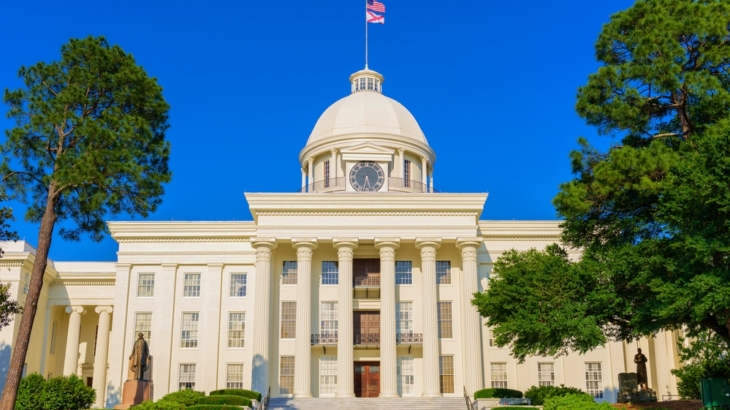Alabama Statehood and Its State Constitution History
LISTEN ON SOUNDCLOUD:
Long before Alabama was recognized as the 22nd state of the United States of America, it was home to generations of Native Americans belonging to numerous and varied tribes such as the Alabama (or Alibamu), Cherokee, and Choctaw. Europeans entered what is modern day Alabama in the early part of the 16th century, with the first documented visit by Spanish explorer Hernando de Soto in 1539.
By the mid-17th century, England had laid claim to modern day Alabama and included its territory in the Province of Carolina. As early as 1687, English traders from the province frequently traveled to the Alabama River valley to trade with Native Americans. However, the French also claimed the territory as their own and the two countries engaged in fierce competition for Indian trade for several decades until the French and Indian War broke out in 1754.
After suffering defeat, the French ceded its territories east of the Mississippi River to Great Britain. Modern day Alabama’s border would continue to shift – and change hands between England, Spain, and finally America – until 1817 when the eastern portion of the United States’ Mississippi Territory would be divided to create the Alabama Territory. Finally, on December 14, 1819, Alabama was admitted as the 22nd state to the Union.
Just as Alabama’s boundary lines changed numerous times over the years, so too did its capital. The first was the territorial capital in St. Stephens in 1817, near present-day Jackson, Alabama. Then in 1819, Huntsville served as the temporary capital while a convention assembled to prepare a State Constitution. The first “permanent” capital was established in 1820 near the convergence of the Alabama and Cahaba rivers but a flood resulted in damage to the statehouse. The capital was soon moved to Tuscaloosa in 1826 to a new three-story building designed by the same architect, William Nichols, who designed the old capitols in North Carolina and Mississippi. The capital made one final move in 1846 to its current location of Montgomery, but a disastrous fire shortly after required its rebuilding.
Alabama’s early Constitutions were considered a reflection of Jacksonian popular democracy. The post-Reconstruction era produced the 1901 Constitution, which with hundreds of amendments, is the longest state constitution in America. Reform of the constitution, including repeal of impediments to participation by African Americans has been adopted through amendments and on an article-by-article basis.
The State of Alabama, which will celebrate its Bicentennial this year, has a rich and vibrant history. Over the past two centuries, its cities and towns have been the scenery of some of our Nation’s most important and compelling stories; from the unshakable courage displayed at Selma’s Edmund Pettus Bridge to the scientific and engineering feats performed in Huntsville that helped put men on the moon. Alabama’s people have been history-makers as well. This state has given our nation and the world the Tuskegee Airmen, Helen Keller, Hank Williams, Jesse Owens, Harper Lee, Willie Mays and more names too numerous to list.
Jeremy Ward is the development officer for the American Village Citizenship Trust, a pioneering and innovative American history and civics education center located in central Alabama. Utilizing costumed historical interpreters, the American Village invites students and general public visitors to “step into the scenes” of America’s journey for freedom and independence, and to examine how the lessons that can be learned from our Nation’s revolutionary beginnings are still vitally relevant today in our roles as private citizens. For the past 15 years, Ward has held philanthropic leadership positions in the nonprofit (Boy Scouts of America) and higher education sectors (from traditional liberal arts to major urban research institutions). He can be reached at jward@americanvillage.org.
Click Here to have the NEWEST essay in this study emailed to your inbox every day!
Click Here to view the schedule of topics in our 90 Day Study on Congress.




Join the discussion! Post your comments below.
Your feedback and insights are welcome.Feel free to contribute!